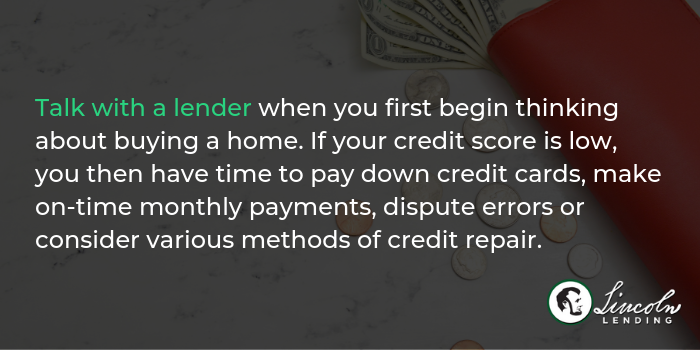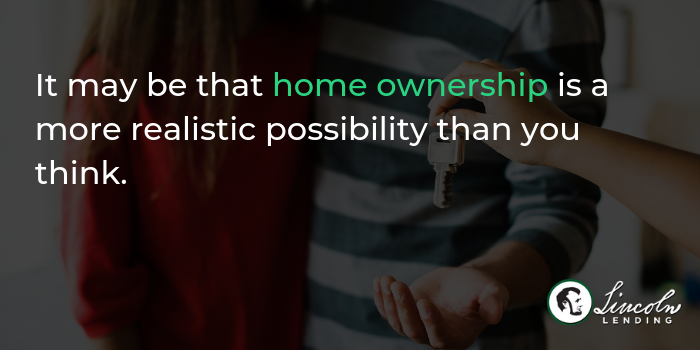You have found a good job and plan to stay in the area for a while. You have paid down your credit card, but are also currently making monthly car loan payments. Will this type of scenario, or others like it, impact your ability to qualify for a home loan in Oklahoma? What do lenders want to see when they are qualifying a potential home loan borrower?
Home loan programs widely vary, and each one has its own requirements. Lenders look at lots of factors, but there are three key factors: credit score, debt-to-income ratio, and down payment/cash to close.
Credit Score
Mortgage Lenders require a minimum credit score to qualify for a home loan. This score is calculated differently than those that would qualify you for other types of loan, like a car loan. Mortgage loan programs usually require a minimum credit score of 580, however there are a couple of programs that allow lower scores in certain cases. For example, an FHA loan requires a 530 minimum credit score and the HUD-184 Native American loan has no minimum credit score if you meet other program qualifications.
You can check with several credit-related organizations online for a general idea of your credit score, but the lender will still need to run your credit reports to get an accurate score for mortgage purposes.

Talk with a lender when you first begin thinking about buying a home. If your credit score is low, you will have time to pay down credit cards, make on-time monthly payments, dispute errors or consider various methods of credit repair. By being proactive about this early on, you can also address any “derogatory marks” on your credit report. These are negative items like payments over 30 days late, judgments, collections, repossessions or bankruptcy.
Debt-to-Income Ratio (DTI)
DTI can be defined as how much money you earn vs. your existing monthly expenses, including those listed on your credit report. There are specific calculations lenders use to evaluate if you can “afford” a house.
A healthy ratio for most clients is 27/41. In the mortgage world, a regularly-used phrase is “27 on the front-end and 41 on the back-end.” This means lenders want your overall mortgage payment — including taxes, insurance, and private mortgage insurance (PMI) — to be less than 27% of your gross monthly income. This is the front-end. The back-end ratio of 41 means lenders want your mortgage payment plus your monthly debts to be less than 41% of your gross monthly income. This is not an absolute rule. In certain circumstances, your debt-to-income ratios can be higher than 27/41. Your lender will help you figure this out.
“Debt” is anything that shows up on a credit report like car loans, student loans, or credit cards. You must also tell the lender about debts or recurring obligations that don’t appear in a credit report. These could include child support, alimony, owner-financed properties or cars, IRS debts, etc.
Unpaid judgments or past-due taxes must be paid off for most loan programs. Some programs allow you to still get a loan if you have an approved payment arrangement in place.
Down Payment / Cash to Close
Most loan programs require a down payment, although some do not. Examples of programs that do not include Veteran’s Administration (VA) and Rural Development loans.
The required minimum down payment varies from program to program and generally ranges from zero to 5% of the purchase price of the home. First-time home buyers may also be eligible for several programs to assist with down payments.
Closing costs and “prepaids” are out-of-pocket expenses that you will be required to pay when you close on your new home. This includes inspections, appraisals, taxes, insurance, etc.
There are alternatives for home buyers that don’t meet normal industry standards. Lincoln Lending works with specialty companies that offer alternatives on a case-by-case basis. Typically, the borrower will need more money down on the front end, and the interest rate is generally higher for these programs.
Other Considerations
- Lenders like job stability and are cautious about “job hoppers.” They are generally looking for at least two years in a stable occupational position, for income purposes. But if you have made job changes for more money or opportunity in your industry, it can be explained and then taken into consideration. If you are a recent high school or college graduate and your job relates to your field of study, you may not need the normal employment history. Every situation is different. But a good rule of thumb is to avoid switching jobs in the middle of the mortgage process, because this can cause delays.
- You will need a two-year history at the new job if you have changed from a W2 to a 1099 or self-employed position. Commissions and bonuses generally cannot be considered employment income unless you have been at the same employer for two years or at least have two years in the same job/industry. Talk with your lender as soon as possible since there are many options available depending on your specific situation.

It may be that homeownership is a more realistic possibility than you think. For the most part, lenders want you to be successful in managing a mortgage. They look at key measures to be sure you are not taking on too much debt. But many people are surprised at the options that make homeownership affordable.
If you have questions about if you can get pre-approved for a mortgage, get in touch with our team. Our Loan Officers will help you figure out which type of loan is best for you. Just click below to schedule a free, no-obligation coaching session.

